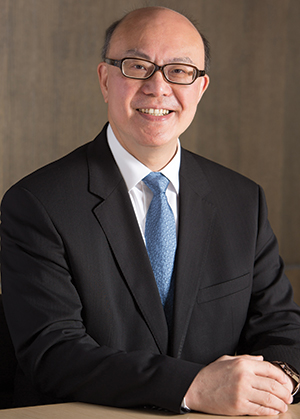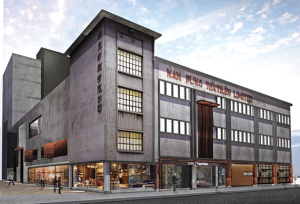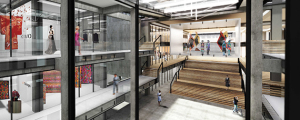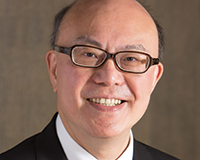 Plenty of developers secretly fancy themselves as grand designers. Grand designers whose vision is at least equal to that of world-renowned architects.
Plenty of developers secretly fancy themselves as grand designers. Grand designers whose vision is at least equal to that of world-renowned architects.
Donald Choi is one of the few who could justify such a claim. Not that you would be likely to hear him make it.
The managing director of Nan Fung Development, one of the largest developers in Hong Kong, spent seven years working for Foster + Partners, overseeing the creation of the city’s new airport on the reclaimed island of Chek Lap Kok which completed in 2000. At the time it was the largest infrastructure project in the world.
“It was a very interesting project – very challenging but with a lot of job satisfaction,” according to Choi – who says – in characteristically understated style – he became an architect to “improve the built environment”.
With the airport finally finished, the opportunity arose to make the switch to developer and he jumped at the chance to help shape some of the largest residential and commercial developments in Hong Kong and, increasingly, around the world.
High profile
Nan Fung was established by mainland China-born Chen Din Hwa in 1954 as a textiles company which later diversified into real estate development.
 Chen, who was so well known in his heyday that he was referred to as the King of Cotton Yarn in Hong Kong, died in 2012, leaving his younger daughter Vivien in charge of the company. Forbes Asia’s 2015 list of the 50 wealthiest people in Hong Kong puts her net worth at $4.6bn (£3bn) making her the 14th richest in the city, albeit with a legal battle for control of the company with Chen’s ex wife Yang Foo Oi and his elder daughter Angela – Vivien’s mother and sister – as yet unresolved.
Chen, who was so well known in his heyday that he was referred to as the King of Cotton Yarn in Hong Kong, died in 2012, leaving his younger daughter Vivien in charge of the company. Forbes Asia’s 2015 list of the 50 wealthiest people in Hong Kong puts her net worth at $4.6bn (£3bn) making her the 14th richest in the city, albeit with a legal battle for control of the company with Chen’s ex wife Yang Foo Oi and his elder daughter Angela – Vivien’s mother and sister – as yet unresolved.
Today Nan Fung is engaged in some of the highest profile residential and commercial developments in Hong Kong. While it remains a private company, meaning publicly available information about its finances is limited, the roadshow particulars for a US$350m (£227m) bond issued by the company put its NAV at HK$94.4bn (£8.1bn) as at March 2013.
Last month it emerged victorious in the bidding for the latest high-profile land sale from Hong Kong’s MTR Corporation, the company which operates the city’s metro network.
It paid £280m for a 147,000 sq ft site at Lohas Park in Hong Kong’s New Territories, where it will build 2,400 homes.
Nan Fung’s aggressive bid for the site – which saw off competition from rival development giants including
Li Ka Shing’s Cheung Kong and the Kwok Brothers’ Sun Hung Kai Properties – reflects its confidence in the market, despite the government’s aggressive cooling measures designed to dampen house prices that are the most expensive in the world relative to local incomes.
Contentious politics
But there is a flipside to such success. Being a developer, particularly a “tycoon-controlled” one, has put Nan Fung firmly in the crosshairs of the current Hong Kong government in recent years – especially since the city’s chief executive, ex-Jones Lang Wootton and DTZ director CY Leung, came to power in 2012 with the promise to take on the tycoons and make housing more affordable.
 Having managed the sensitivities around Hong Kong’s airport construction – the British were desperate to complete the scheme prior to the handover of Hong Kong in 1997 but the Chinese ultimately won that battle and formally opened it in 1998 – Choi is no stranger to managing the often contentious politics of developing in Hong Kong.
Having managed the sensitivities around Hong Kong’s airport construction – the British were desperate to complete the scheme prior to the handover of Hong Kong in 1997 but the Chinese ultimately won that battle and formally opened it in 1998 – Choi is no stranger to managing the often contentious politics of developing in Hong Kong.
Among the measures introduced by the government have been massive hikes in stamp duty on corporate and overseas buyers, coupled with concerted efforts to increase the tightly controlled land supply.
So, perhaps unsurprisingly, Choi strikes a conciliatory tone when it comes to the administration’s handling of the housing market.
“The additional supply of developable land will give us additional opportunities to participate in the market,” he says.
Nan Fung is already taking advantage of some of the government’s policies, converting its old textile factories into houses thanks to relaxed
change-of-use regulations.
“Also I think because of the various measures being suggested or implemented by the government, it does actually provide a buffer if the market suddenly has a downturn,” Choi says.
In total the government’s new taxes and levies can add as much as 40% to transaction costs, which might have been expected to hit developers hard.
“If there is an external shock and the property market has some pressure to go south the government can very easily be a bit more flexible and reduce the transaction cost so it gives a bottom support to the property prices,” he adds.
Choi says he welcomes the attempt by the government to make the market less volatile.
But given Hong Kong’s obvious geographic constraints and the huge demand for homes from mainland Chinese buyers, the cooling measures have not been altogether successful, which contributed to the level of public support, at least initially, for the Occupy protests last year.
Those same forces of geographic constraint and mainland demand that have helped inflate the HK market have also prompted Nan Fung to look further afield and the company is now highly active in China, with projects in seven major cities.
It is the second largest shareholder in Sino Ocean Land, a top-10 mainland developer listed in Hong Kong. It also owns the InfraRed NF Greater China Fund, originally set up as a US$700m joint venture with HSBC, and it runs its own development platform too.
The company’s mainland interests are reported to account for around 30% of its total asset value. And it is increasingly looking even further afield.
UK return
Late last year the group returned to the UK market, making its first commercial property purchase in London for 14 years with the £150m acquisition of 50 Bank Street, E14, from Canary Wharf Group.
The deal – which was actually on behalf of Chen’s private family office, Crosby Investment Holdings – was the first since the company bought 1 King William Street, EC4, and 60 Gracechurch Street, EC3, in 2000.
Choi says the return to the UK was largely opportunistic. With prime office yields in Hong Kong at around 2.8% according to JLL, the 5.4% yield on 50 Bank Street, which is let for seven more years to Northern Trust, reflected an attractive proposition.
“Obviously the macro economy is starting to look reasonably on the robust path of recovery so it is all about the right timing and also the right opportunities being available,” Choi says of the return to the UK market.
“We definitely would explore more investment opportunities overseas, including in the UK,” he adds.
“We believe that it is a good time to develop opportunities and hopefully we will identify the right opportunities for us to make more investment.”
As for whether the group would like to expand its UK activities beyond dry investment and into the sort of development activity for which it is best known, Choi is more circumspect.
He says the company is considering refurbishment opportunities but any outright development would have to be done in tandem with a local partner and while it has had some exploratory meetings, it does not appear to be a priority.
The amiable architect turned developer is already busy navigating the most expensive and politically contentious market in the world. London’s own volatile mixture of politics and prices could prove boring by comparison.











